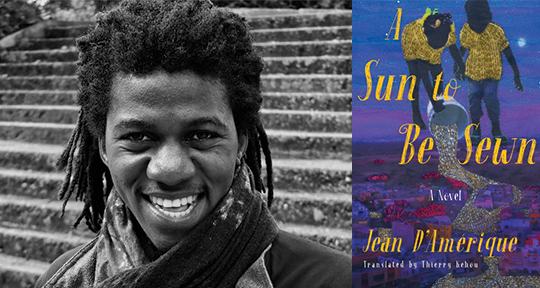A Sun to be Sewn by Jean D’Amérique, translated from the French by Thierry Kehou, Other Press, 2023
March of 2023 will bring A Sun to be Sewn, a novel by Haitian poet, playwright, and novelist Jean D’Amérique, translated from the French by Thierry Kehou, to bookshelves around the world. D’Amérique explores ravaged landscapes of the city and the heart, delves deep into wounds collective and individual, and parses fragments of hope shored against the ruin of a land ravaged by violence and destitution. Recounting the story of a young Haitian girl fleeing from a cruel prophecy and into the arms of her beloved, treading a path that weaves amidst the dangers of her Port-au-Prince slum, D’Amérique unfolds a panorama of pain and courage, death and desire, telling all in a wounded lyrical style that haunts the reader long after the novel’s end.
A Sun to be Sewn is narrated by a talented young girl, known to the reader as Cracked Head, living in a slum in Port-au-Prince, Haiti. Her mother, Orange Blossom, is a prostitute struggling with alcohol addiction, “drowning,” as Cracked Head puts it, “to draw her halo from the abyss.” Her adoptive father, Papa, makes money from various criminal activities, working for a cruel and powerful man known as the Angel of Metal. Cracked Head is no stranger to crime herself, as it provides for survival which would otherwise be impossible. Even so, she lives off of “bread and sweetened water,” anchoring her hope in the image of her beloved: Silence, the daughter of her teacher.
READ MORE…


